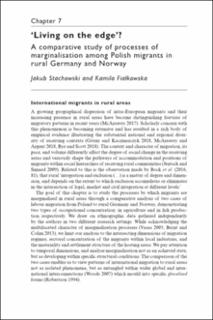‘Living on the edge’? A comparative study of processes of marginalisation among Polish migrants in rural Germany and Norway
Chapter
Published version

Åpne
Permanent lenke
https://hdl.handle.net/11250/2684731Utgivelsesdato
2020Metadata
Vis full innførselSamlinger
Originalversjon
10.4324/9781003022367Sammendrag
This chapter explores comparatively two cases of Polish labour migration in two different national and rural contexts of migration. We draw on ethnographic data from two projects which respectively looked at a once widely popular seasonal migration by Polish workers in German agriculture, and a more recent non-seasonal migration to the Norwegian salmon industry following the 2004 European Union enlargement. We demonstrate that in both instances Polish migrants are located at the margins of the receiving rural communities, and we illustrate how their position is shaped by the interplay of structural factors and agency of the migrants. We identify working arrangements as playing a pivotal role in shaping the marginalisation of migrants. At the same, taking account of migrants’ agency enables us to grasp how they effectively counterbalance their underprivileged positions through concrete practices and rationalisations of their situation.
